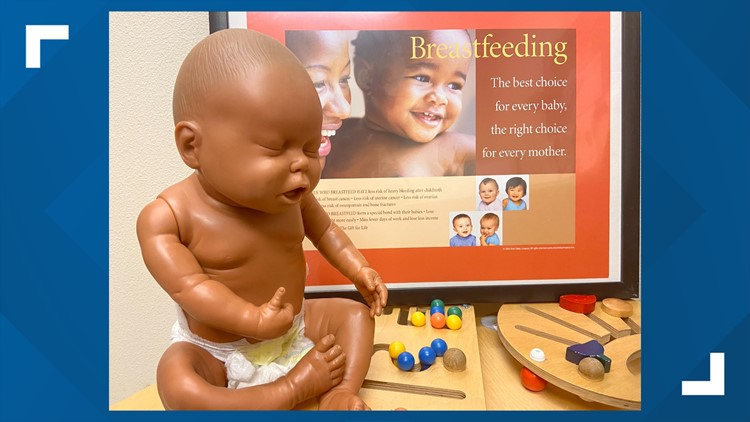BRADENTON, Fla. — The Women, Infants and Children (WIC) nutrition program based at the Florida Department of Health in Manatee County (DOH-Manatee) encourages young black families with newborns to explore the benefits of breastfeeding.
The push is part of various programs the agency is highlighting during Black Breastfeeding Week which runs from Aug. 25-31. The commemoration began eight years ago to bring awareness to issues and challenges black women face while nursing their newborn babies.
According to the Centers for Disease Control, less than 60% of black newborns are breastfed compared to around 70% of white newborns. It's a rate health experts say needs to change.
"One of the main areas of focus for WIC is to help establish breastfeeding as a foundation of life for newborn babies," says Melissa Rosenburg Ehrmann.
Rosenburg Ehrmann is a breastfeeding coordinator and registered dietitian and the acting director of Manatee WIC.
The Black Mothers' Breastfeeding Association is one of the organizations promoting breastfeeding among the black population. The organization has highlighted five reasons why a week of awareness is necessary:
• High Black Infant Mortality Rate – The Centers for Disease Control and Prevention (CDC) reports that increased breastfeeding among black women could decrease infant mortality rates in the black population by as much as 50 percent.
• High Rates of Diet-Related Disease – Breast milk is the best preventative medicine for, among other things, upper respiratory infections, Type II diabetes, asthma, childhood obesity and Sudden Infant Death Syndrome.
• Lack of Diversity in the Lactation Field
• Unique Cultural Barriers Among Black Women
• Lack of Support in Black Communities
"We realize that there may be challenges for some new mothers as they feed their children this way," says Rosenburg Ehrmann. "That's why we offer coaching, counseling and access to a network of support groups to help make this bond as strong as possible.".
Advocates of breastfeeding argue that there is excessive promotion of formula to black mothers rather than pushing for more resources to help them with the lactation process.
"Unfortunately our black mothers tend not to get a lot of support whether it's at home or through doctors' offices or even the hospitals," said Laura Moylan, a lactation specialist with Manatee WIC.
They also say due to legitimate challenges many black new moms face, there is also an overreliance on formula.
"The notion was that formula was better than breast milk and then the formula companies were saying formula is just like breast milk, when in fact that’s not true, formula will never be just like breastmilk," Moylan said.
Whether it is loss of income issues, health challenges, unfavorable maternity options offered by employers, to societal stigma surrounding breastfeeding, the challenges are overwhelming for many new moms. However, experts say right from the onset of ante-natal stage to post-partum stage those challenges are often more amplified for many black moms, regardless of income or education status.
"If we can change that conversation not only with the mothers that are in the office, but also their family members and get that support from home then we can change this whole conversation and hopefully improve everything," said Moylan.
The "WIC", or Woman Infants and Children program, teaches new mothers good nutrition habits for their kids. Lactation support services are free with WIC and the program can assist with providing food to help families eat better. New mothers automatically qualify if they currently receive Medicaid, temporary cash or food assistance. If you live in a house of two, your annual income needs to be less than $31,895. Each additional person in the household expands the cap by another $8, 288. These benefits apply until the child turns 5. Four counties in Florida, including Pinellas, actually received national awards for their W-I-C programs.
Increased Fruit & Vegetable Benefits
On March 12, the American Rescue Plan Act (ARPA) authorized WIC agencies to increase WIC benefits through the summer of 2021. As a result, the WIC vegetable and fruit voucher increased from $9 per month for children and $11 per month for women to $35 per month per participant.
WIC's vegetable and fruit voucher is known as the Cash Value Benefit (CVB). The CVB is credited with improving the dietary quality of WIC participants and reducing the prevalence of childhood obesity among WIC toddlers.
Florida WIC will honor the CVB increase through September 30. All children 1-4 years old and all women who participate in the WIC program will receive an increase in their fruits and vegetables cash voucher to $35 per participant for the month of September.
For example, a pregnant woman and her 2-year-old child will receive a total of $70 in cash vouchers to use on fruits and vegetables for September. Fruits and vegetables can be fresh, frozen or canned and any brand, variety, size with no added sugar, syrup, artificial sweeteners, fat or oil. Organic fruits and vegetables are allowed.
Additional WIC Services
Peer counselors and lactation professionals can provide counseling by phone (hotline is available outside of normal business hours), in person, and via Microsoft Teams.
WIC is also completing one-on-one prenatal classes by phone and group classes by Teams.
Once the threat of COVID-19 passes, Manatee WIC plans once again to offer face-to-face group support. This would include prenatal breastfeeding classes in both English and Spanish, a weekly support group and a class to educate the fathers of newborns on the roles they can play in the breastfeeding process.
WIC will also reinitiate community presentations, including bi-monthly classes with the TeenAge Pregnancy Program and SOLVE Maternity Homes.
For more information on all of these services, call Manatee WIC at (941) 741-3400 and ask for breastfeeding support.



